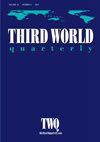总统特权、外部形势和西西弗斯式的IMF贷款安排:考察后阿拉伯之春突尼斯和埃及的财政危机
IF 1.8
2区 经济学
Q2 DEVELOPMENT STUDIES
引用次数: 0
摘要
本文章由计算机程序翻译,如有差异,请以英文原文为准。
Presidential prerogatives, exogenous situations, and Sisyphean IMF loan arrangements: examining fiscal crises in post-Arab Spring Tunisia and Egypt
Abstract Since the Arab Spring’s overthrow of leadership in Tunisia and Egypt in 2011, both states find themselves in severe fiscal crisis due to currency shortages, high external debt and inflation, despite loan arrangements from the International Monetary Fund (IMF). Why has a decade of IMF loan programmes been unable to offset these economic imbalances? This article assesses the financial situations in both state cases, outlines the processes and provisions of IMF loan programmes, looks to specific examples of application in post-Arab Spring Tunisia and Egypt, and then articulates whether domestic leadership, exogenous crises, or IMF conditionality arrangements best explain the inability of the IMF to address these fiscal issues. It concludes by placing most of the blame on conditionality of IMF loan programmes, which encourage austerity and increased debt rates, creating a ‘Sisyphean arrangement’ where both states remain continuously inclined to accept further loan programmes, without alternative for economic reform to offset debt. However, effects of domestic leadership actions and exogenous crises remain highly influential on the performance of state economies, illustrating that the IMF’s position as being able to solve most fiscal problems is inhibited by these factors as well.
求助全文
通过发布文献求助,成功后即可免费获取论文全文。
去求助
来源期刊

Third World Quarterly
DEVELOPMENT STUDIES-
CiteScore
4.10
自引率
15.00%
发文量
137
期刊介绍:
Third World Quarterly ( TWQ ) is the leading journal of scholarship and policy in the field of international studies. For almost four decades it has set the agenda of the global debate on development discourses. As the most influential academic journal covering the emerging worlds, TWQ is at the forefront of analysis and commentary on fundamental issues of global concern. TWQ examines all the issues that affect the many Third Worlds and is not averse to publishing provocative and exploratory articles, especially if they have the merit of opening up emerging areas of research that have not been given sufficient attention. TWQ is a peer-reviewed journal that looks beyond strict "development studies", providing an alternative and over-arching reflective analysis of micro-economic and grassroot efforts of development practitioners and planners. It furnishes expert insight into crucial issues before they impinge upon global media attention. TWQ acts as an almanac linking the academic terrains of the various contemporary area studies - African, Asian, Latin American and Middle Eastern - in an interdisciplinary manner with the publication of informative, innovative and investigative articles. Contributions are rigorously assessed by regional experts.
 求助内容:
求助内容: 应助结果提醒方式:
应助结果提醒方式:


